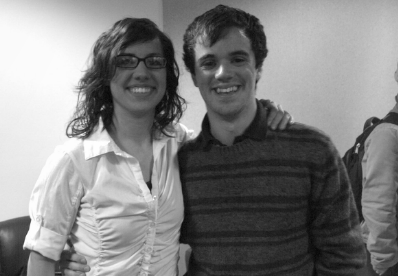Marquette Student Government Senate met with Alderman Bob Bauman at its meeting Thursday to discuss changes in traffic patterns around campus that the university could potentially help fund, including attempts to slow traffic and increase student safety.
Bauman, who represents Milwaukee’s fourth district (including Marquette’s campus), meets with the MUSG Senate once per academic year to discuss issues that affect the Marquette area. He was joined at the meeting by Vice President of Public Affairs Rana Altenberg and Jeffrey S. Polenske of the Milwaukee Department of Public Works.
Bauman said he has received requests to install traffic lights where North 16th and North 17th Streets intersect Kilbourn Avenue and to convert those streets from one-way to two-way. The goal of these changes would be to slow traffic through areas densely populated with students.
“These proposals have been around for a long time,” Bauman said. “The city is amenable to converting 16th and 17th into two-way operations.”
Some MUSG senators expressed concern about the cost to the university of the potential changes. Bauman said adding traffic signals to each intersection would cost about $70,000 and that the city has not budgeted enough to cover the full cost of street conversions and traffic light installations. This means Marquette would likely have to share the cost of the changes with the city.
Altenberg said MUSG has been instrumental in the past in determining traffic patterns around campus, referencing a past recommendation to install medians on Wells Street in front of the Alumni Memorial Union.
At the meeting, the MUSG Senate also passed an amendment to its constitution and offered two recommendations to the university.
The amendment, authored by Executive Vice President and senior in the College of Arts & Sciences Joe Daufenbach, eliminated the student advocate position within MUSG’s Executive Council. The legislation argued that the Student Advocate was unnecessary and weakened communication between the university and MUSG. The amendment passed unanimously.
“The position wasn’t effective as it stood,” Daufenbach said. “So essentially now what we’ve done is made a more streamlined and efficient system for conveying information between university administration and the senate.”
Junior Arts & Sciences Senator Zach Bowman, a candidate for executive vice president in this month’s elections, authored legislation recommending that the Office of the Ombuds be made available to the student body. The hope of MUSG is that access to the Ombuds will “create a confidential, impartial outlet for students (to) voice academic and personal disputes” with the university. The recommendation passed unanimously.
MUSG also passed a recommendation that the university establish a “Bias Incident Reporting Process.” The legislation, authored by off-campus Senator Marisa Galvez, a senior in the College of Arts & Sciences, and President Arica Van Boxtel, a senior in the College of Communication, argued that Marquette needs to take an active role in protecting its students and faculty from incidences of bias on campus. The legislation pointed to 16 other Jesuit colleges and universities that have a “well-defined hate crime and incident reporting system.”


